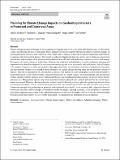Planning for climate change impacts on geoheritage interests in protected and conserved areas
Abstract
Climate change presents challenges for the management of geoheritage at all scales from individual geosites to whole landscapes, and affecting all areas of the planet. Direct impacts will arise principally through the effects of climate changes on geomorphological processes and vegetation cover, while indirect impacts will result from hard engineering interventions to mitigate risks from natural hazards. We present an indicative framework that sets out key steps to help geoconservation practitioners and managers of all protected and conserved areas (PCAs) with geoheritage interests to assess and manage the impacts of climate change on geoheritage. Strategies for mitigation and adaptation to assist contingency planning and implementation should be supported by site condition monitoring and as far as possible work with nature, but will require to be adaptive in the face of many uncertainties. Our approach is based on assessment of the risk of degradation of geosites and their features and processes arising from the likelihood of climate change affecting them and the predicted severity of impacts. The risk of degradation of a site, feature or process will depend on (i) its geographic location and proximity to geomorphological systems that are likely to respond dynamically to climate changes; (ii) the magnitude, rate and duration of these changes; and (iii) intrinsic factors that include the geological and physical characteristics of the site and its features and processes. Management options range from non-intervention to planned interventions informed by the risk of degradation assessment. However, documentation for posterity may be the only practical option for geoheritage interests close to existential thresholds, such as small mountain glaciers, and sites at risk from sea-level rise and coastal or river erosion. Adaptation strategies for geoheritage in protected and conserved areas should, as far as practicable, align with those for biodiversity and aim to deliver multiple co-benefits for nature and people, although economic, social and political constraints may hinder implementation where wider stakeholder interests are involved. Managers of PCAs will need substantial input from geoconservation experts to carry out the assessments recommended and determine the action required.
Citation
Gordon , J E , Wignall , R M L , Kirkbride , V , Crofts , R & Tormey , D 2022 , ' Planning for climate change impacts on geoheritage interests in protected and conserved areas ' , Geoheritage , vol. 14 , 126 . https://doi.org/10.1007/s12371-022-00753-1
Publication
Geoheritage
Status
Peer reviewed
ISSN
1867-2477Type
Journal article
Collections
Items in the St Andrews Research Repository are protected by copyright, with all rights reserved, unless otherwise indicated.

